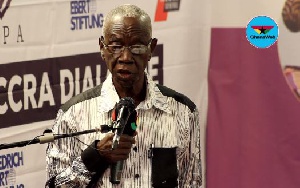 Dr Afari Gyan, former Chairman of the Electoral Commission
Dr Afari Gyan, former Chairman of the Electoral Commission
No Chairperson of the Electoral Commission (EC), in spite of the political coloration of that person, can change poll results given the structure of Ghana’s elections and EC systems, Dr Kwadwo Afari-Gyan, former Chair of the election management body, has said.
According to him, one must be “a big fool” to think he or she can change elections results as chair of the EC.
Speaking at the Accra Dialogue on the theme: ‘Consolidating Ghana’s Democratic Governance: The role of the Electoral Commission’ on Wednesday, 22 August 2018, Dr Afari-Gyan said: “I believe that given the structure of our elections, unless it were to change radically, it will make little difference if you made him [pointing to Peter Mac Manu and Samuel Ofosu Ampofo of the NPP and the NDC, respectively, who were discussants] the chair of the Electoral Commission”.
“It will make very little difference. If you look at the structure, you will see that as the Chair of the commission, you will be the last person to see the results. Yes, everybody has seen the results and you must be a big fool to change the results, you cannot do it”, Dr Afari-Gyan said, adding: “Even though by law, the Electoral Commission plays a leading role in establishing electoral democracy, it cannot do it all alone; it must, of necessity, build durable partnerships with relevant stakeholders”.
“It has rightly been said that no matter how well an Electoral Commission does its work, unless the external environment is right, conducting free and fair elections might be like dipping a piece of white cloth in murky water and hoping that it would not be stained.”
He also noted that the trend where political parties and their agents declare winners of elections before the chair of the EC does, is worrying.
According to him, this act breeds unnecessary tension and is also a recipe for chaos in the country.
Dr Afari-Gyan has, therefore, asked all stakeholders to discourage such action in order to preserve the peace of the country.
“The insipient practice where political parties announce winners ahead of the returning officer is to be discouraged to avoid unnecessary tensions and possible chaos.”
He added: “…The task of the Electoral Commission is to educate the people. In this effort, the Electoral Commission distinguishes between voter education and electoral education. Every voter needs voter education.
“On the other hand, the electoral education seeks to give specific group like the police, party agents, journalists and judges the knowledge they require for effective participation in the electoral processes.”